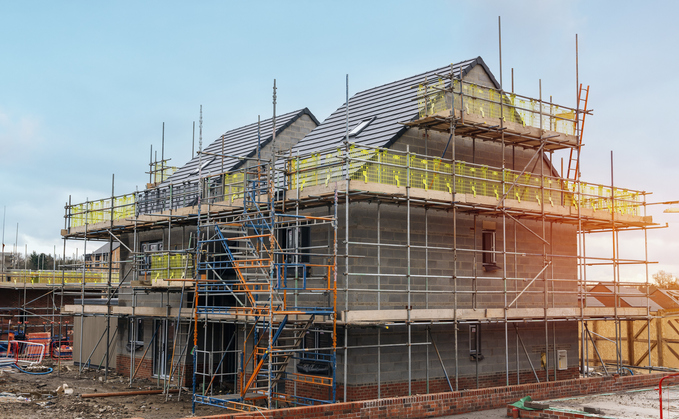Credit: iStock
YouGov poll suggests majority of MPs back installation of solar panels, heat pumps, and energy storage as standard on new build properties
Four-out-of-five MPs support making solar panels mandatory on all new-build homes, according to a YouGov poll commissioned by the MCS Foundation.
The survey found 83 per cent of Labour MP and 73 per cent of Conservative MPs polled believe solar panels should be incorporated into all new builds by 2025, while 61 per cent of those quizzed - 47 per cent of Conservatives and 77 per cent of Labour MPs - also agreed battery storage systems should come as standard.
Moreover, 56 per cent of surveyed MPs, including 43 per cent of Conservatives and 72 per cent of Labour MPs, agreed that heat pumps should incorporated into all new builds by 2025.
The poll comes as the Department for Levelling Up, Housing, and Communities continues to consult on how the government should deliver its new Future Homes and Future Buildings Standards with the consultation process set to close on March 6th.
The consultation document confirmed the government has found "no practical way" to simultaneously allow the installation of fossil fuel boilers while delivering significant carbon savings and "zero-carbon ready" homes.
As such, it does not expect gas, hybrid heat pumps, and hydrogen-ready boilers to meet the new standards, paving the way for a sharp increase in demand for heat pumps, district heat networks, and electric heating systems.
It states that new regulations and guidance will be published in 2024, with Standards coming into force the following year.
Today's survey results came in the same week as the government launched a separate consultation on heat pump installation rules, which sets out plans to scrap regulations preventing people putting an air source heat pump within a metre of a property boundary.
The consultation on Permitted Development Rights for Air Source Heat Pumps closes on April 9th.
The MCS Foundation said the new regulations for new build homes present a key opportunity to boost renewable energy capacity in the UK and lock in low energy bills for homeowners.
"When it comes to constructing modern homes that are climate-friendly and cheap to run, building-in solar panels, batteries for energy storage, and heat pumps from the start is very clearly the way to go," said David Cowdrey, director of external affairs at the MCS Foundation.
"It is very encouraging that such a clear majority of MPs back the principle of renewable energy for all new homes. The government now has a mandate to require a meaningful deployment of solar panels as well as battery storage on new-builds under the Future Homes Standard, and it must enact that as soon as possible."
Chris Hewett, chief executive of trade association Solar Energy UK, argued that "everyone wins" from making solar power effectively mandatory for new housing.
"It means lower bills for newbuild homeowners and greater energy security for us all, plus progress towards net zero, through cutting reliance on pricey natural gas," he said. "The policy would save newbuild homeowners between £910 to £2,120 per year, according to the government consultation, while pushing purchase prices up only marginally."
YouGov's polling comes off the back of a year in which heat pump installations across the UK grew by almost 20 per cent, with certified heat pumps operating in the UK now surpassing the 200,000 mark, MCS Foundation reported last month.
Moreover, 2023 heralded a record year for small-scale green energy and heat installations such as rooftop solar and heat pumps, with more than 220,000 installations registered overall in 2023.
However, the government is reportedly considering scrapping one of its key policies designed to build the market for heat pumps across the UK, in response to lobbying against the introduction of the Clean Heat Market Mechanism from fossil fuel firms and boiler manufacturers.
Want to understand what is going on at the cutting edge of sustainability? Check out BusinessGreen Intelligence - the premier information for professionals focused on the UK's green economy.










